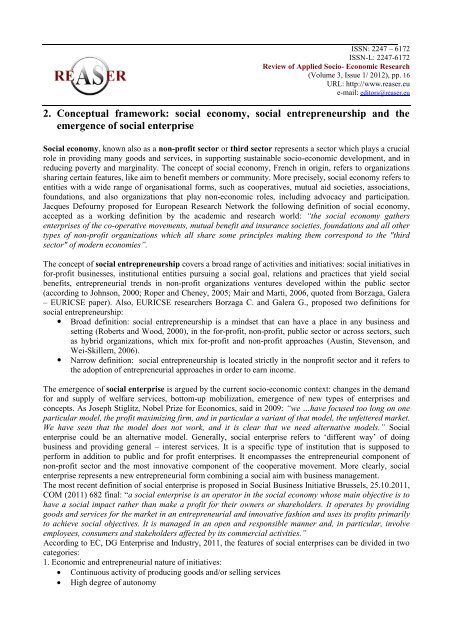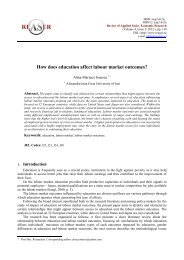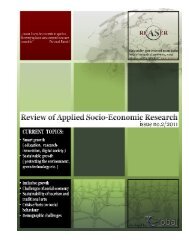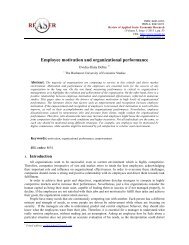Volume 3, ISSUE1/2012 - Review of Applied Socio-Economic ...
Volume 3, ISSUE1/2012 - Review of Applied Socio-Economic ...
Volume 3, ISSUE1/2012 - Review of Applied Socio-Economic ...
You also want an ePaper? Increase the reach of your titles
YUMPU automatically turns print PDFs into web optimized ePapers that Google loves.
ISSN: 2247 – 6172<br />
ISSN-L: 2247-6172<br />
<strong>Review</strong> <strong>of</strong> <strong>Applied</strong> <strong>Socio</strong>- <strong>Economic</strong> Research<br />
(<strong>Volume</strong> 3, Issue 1/ <strong>2012</strong>), pp. 16<br />
URL: http://www.reaser.eu<br />
e-mail: editors@reaser.eu<br />
2. Conceptual framework: social economy, social entrepreneurship and the<br />
emergence <strong>of</strong> social enterprise<br />
Social economy, known also as a non-pr<strong>of</strong>it sector or third sector represents a sector which plays a crucial<br />
role in providing many goods and services, in supporting sustainable socio-economic development, and in<br />
reducing poverty and marginality. The concept <strong>of</strong> social economy, French in origin, refers to organizations<br />
sharing certain features, like aim to benefit members or community. More precisely, social economy refers to<br />
entities with a wide range <strong>of</strong> organisational forms, such as cooperatives, mutual aid societies, associations,<br />
foundations, and also organizations that play non-economic roles, including advocacy and participation.<br />
Jacques Defourny proposed for European Research Network the following definition <strong>of</strong> social economy,<br />
accepted as a working definition by the academic and research world: “the social economy gathers<br />
enterprises <strong>of</strong> the co-operative movements, mutual benefit and insurance societies, foundations and all other<br />
types <strong>of</strong> non-pr<strong>of</strong>it organizations which all share some principles making them correspond to the "third<br />
sector" <strong>of</strong> modern economies”.<br />
The concept <strong>of</strong> social entrepreneurship covers a broad range <strong>of</strong> activities and initiatives: social initiatives in<br />
for-pr<strong>of</strong>it businesses, institutional entities pursuing a social goal, relations and practices that yield social<br />
benefits, entrepreneurial trends in non-pr<strong>of</strong>it organizations ventures developed within the public sector<br />
(according to Johnson, 2000; Roper and Cheney, 2005; Mair and Marti, 2006, quoted from Borzaga, Galera<br />
– EURICSE paper). Also, EURICSE researchers Borzaga C. and Galera G., proposed two definitions for<br />
social entrepreneurship:<br />
• Broad definition: social entrepreneurship is a mindset that can have a place in any business and<br />
setting (Roberts and Wood, 2000), in the for-pr<strong>of</strong>it, non-pr<strong>of</strong>it, public sector or across sectors, such<br />
as hybrid organizations, which mix for-pr<strong>of</strong>it and non-pr<strong>of</strong>it approaches (Austin, Stevenson, and<br />
Wei-Skillern, 2006).<br />
• Narrow definition: social entrepreneurship is located strictly in the nonpr<strong>of</strong>it sector and it refers to<br />
the adoption <strong>of</strong> entrepreneurial approaches in order to earn income.<br />
The emergence <strong>of</strong> social enterprise is argued by the current socio-economic context: changes in the demand<br />
for and supply <strong>of</strong> welfare services, bottom-up mobilization, emergence <strong>of</strong> new types <strong>of</strong> enterprises and<br />
concepts. As Joseph Stiglitz, Nobel Prize for <strong>Economic</strong>s, said in 2009: “we …have focused too long on one<br />
particular model, the pr<strong>of</strong>it maximizing firm, and in particular a variant <strong>of</strong> that model, the unfettered market.<br />
We have seen that the model does not work, and it is clear that we need alternative models.” Social<br />
enterprise could be an alternative model. Generally, social enterprise refers to ‘different way’ <strong>of</strong> doing<br />
business and providing general – interest services. It is a specific type <strong>of</strong> institution that is supposed to<br />
perform in addition to public and for pr<strong>of</strong>it enterprises. It encompasses the entrepreneurial component <strong>of</strong><br />
non-pr<strong>of</strong>it sector and the most innovative component <strong>of</strong> the cooperative movement. More clearly, social<br />
enterprise represents a new entrepreneurial form combining a social aim with business management.<br />
The most recent definition <strong>of</strong> social enterprise is proposed in Social Business Initiative Brussels, 25.10.2011,<br />
COM (2011) 682 final: “a social enterprise is an operator in the social economy whose main objective is to<br />
have a social impact rather than make a pr<strong>of</strong>it for their owners or shareholders. It operates by providing<br />
goods and services for the market in an entrepreneurial and innovative fashion and uses its pr<strong>of</strong>its primarily<br />
to achieve social objectives. It is managed in an open and responsible manner and, in particular, involve<br />
employees, consumers and stakeholders affected by its commercial activities.”<br />
According to EC, DG Enterprise and Industry, 2011, the features <strong>of</strong> social enterprises can be divided in two<br />
categories:<br />
1. <strong>Economic</strong> and entrepreneurial nature <strong>of</strong> initiatives:<br />
Continuous activity <strong>of</strong> producing goods and/or selling services<br />
High degree <strong>of</strong> autonomy








